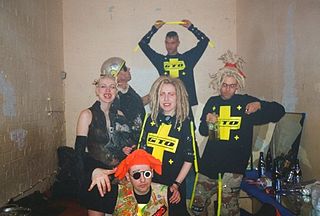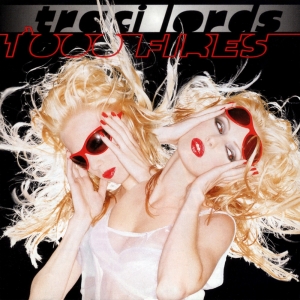
A rave describes a dance party at a warehouse, club, or other public or private venue, typically featuring performances by DJs playing electronic dance music. The style is most associated with the early 90s dance music scene when DJs played at illegal events in musical styles dominated by electronic dance music from a wide range of sub-genres, including techno, hardcore, house, and alternative dance. Occasionally live musicians have been known to perform at raves, in addition to other types of performance artists such as go-go dancers and fire dancers. The music is amplified with a large, powerful sound reinforcement system, typically with large subwoofers to produce a deep bass sound. The music is often accompanied by laser light shows, projected coloured images, visual effects and fog machines.
Detroit techno is a type of techno music that generally includes the first techno productions by Detroit-based artists during the 1980s and early 1990s. Prominent Detroit techno artists include Juan Atkins, Eddie Fowlkes, Derrick May, Jeff Mills, Kevin Saunderson, Blake Baxter, Drexciya, Mike Banks, and Robert Hood.
Jungle is a genre of dance music that developed out of the UK rave scene and sound system culture in the 1990s. Emerging from breakbeat hardcore, the style is characterised by rapid breakbeats, heavily syncopated percussive loops, samples, and synthesised effects, combined with the deep basslines, melodies, and vocal samples found in dub, reggae and dancehall, as well as hip hop and funk. Many producers frequently sampled the "Amen break" or other breakbeats from funk and jazz recordings. Jungle was a direct precursor to the drum and bass genre which emerged in the mid-1990s.

Music for the Jilted Generation is the second studio album by English electronic music group the Prodigy. It was first released in July 1994 by XL Recordings in the United Kingdom and by Mute Records in the United States. Just as on the group's debut album Experience (1992), Maxim Reality was the only member of the band's lineup—besides Liam Howlett—to contribute to the album.
Happy hardcore, also known as 4-beat or happycore, is a music genre of hard dance. It emerged both from the UK breakbeat hardcore rave scene, and Belgian, German and Dutch hardcore techno scenes in the early 1990s.
Breakcore is a style and microgenre of electronic dance music that emerged from jungle, hardcore, and drum and bass in the mid-to-late 1990s. It is characterized by very complex and intricate breakbeats and a wide palette of sampling sources played at high tempos.
Hardcore is a subgenre of electronic dance music that originated in the United Kingdom, the Netherlands, Belgium and Germany in the early 1990s. It is distinguished by faster tempos and a distorted sawtooth kick, the intensity of the kicks and the synthesized bass, the rhythm and the atmosphere of the themes, the usage of saturation and experimentation close to that of industrial dance music. It would spawn subgenres such as gabber.
Bouncy techno is a hardcore dance music rave style that developed in the early 1990s from Scotland and North England. Described as an accessible gabber-like form, it was popularised by Scottish DJ and music producer Scott Brown under numerous aliases.
Nasenbluten were an Australian electronic music group, formed in Newcastle in 1992. The group was made up of Aaron Lubinski, David Melo, and Mark Newlands, and released six studio albums before disbanding in 2001. They have been described as a significant influence on the breakcore genre.

The Stooges is the debut studio album by American rock band the Stooges, released on August 5, 1969 by Elektra Records. Considered a landmark proto-punk release, the album peaked at number 106 on the US Billboard Top 200 Albums chart. The tracks "I Wanna Be Your Dog" and "1969" were released as singles; "1969" was featured on Rolling Stone's list of the "100 Greatest Guitar Songs" at number 35.

David Peel was a New York City-based musician who first recorded in the late 1960s with Harold Black, Billy Joe White, George Cori and Larry Adam performing as David Peel and The Lower East Side Band. His raw, acoustic "street rock" with lyrics about marijuana and "bad cops" appealed mostly to hippies and the disenfranchised.

Mokum Records is a Dutch independent record label specialising in early hardcore and hardcore releases. They have released about 100 single and EP vinyl records between 1993 and 1999 and more than 80 since 2004.

Greater Than One is an English electronic music band, founded by husband and wife Michael Wells and Lee Newman in 1985. They released many albums under this name, and also under the names Tricky Disco, GTO, John + Julie, Church of Extacy, Signs of Chaos, T.D.5, Salami Brothers, Killout Squad, Technohead and L.E.D.. Only a few of their singles were commercially successful. Since Newman's death on 4 August 1995 from cancer, Wells continues to release music under some of these names, and also as The Man and S.O.L.O.

1000 Fires is the debut studio album by American singer and actress Traci Lords, released on February 28, 1995, by Radioactive Records. The album remains her only full-length music release to date. Lords started working on the album in April 1994, and collaborated with producers Juno Reactor, Mike Edwards and Babble. Executive produced by Gary Kurfirst, 1000 Fires is predominantly influenced by electronic music with elements of techno, trance and trip hop. Lyrically, it mostly focuses on dark themes, referring to Lords' past in the porn industry, revealing her rape experience on the song "Father's Field" or dealing with thoughts of suicide on "Fallen Angel".

Good Vibrations is the debut album of the Party Animals and was released in 1996.
React Music Limited was a British, London-based independent record label, that was formed in 1990 by James Horrocks and Thomas Foley. James Horrocks was initially involved with successful dance music independent Rhythm King, and React pursued a similar approach — specifically electronic dance music, house music, acid house, techno and rave, along with newer "dance" oriented subgenres which emerged throughout the 1990s. These included hard house, tech house, trance, hardbag, happy hardcore, drum and bass and chill out.

"I Wanna Be a Hippy" is a song by English electronic group Technohead. The vocals were taken from David Peel's song "I Like Marijuana", which he sung in the movie Rude Awakening. It first appeared as the B-side to the group's Mary Jane EP, issued by Dutch hardcore techno label Mokum Records. John Peel featured the track "Mary Jane" on his show on 10 February 1995, which helped give the release recognition.

Headsex is the first album by Technohead, a pseudonym of the duo Greater Than One, released in 1995. It is the album from which the single "I Wanna Be a Hippy" was taken, which peaked at number six in the UK Singles Chart in February 1996. The song quotes several lines from artist/activist David Peel's song "I Like Marijuana"

Gabber is a style of Rave, electronic music and a subgenre of hardcore techno, as well as the surrounding subculture. The music is more commonly referred to as Hardcore, which is characterised by fast beats, distorted & heavier kickdrums, with darker themes and samples, and was developed in Rotterdam and Amsterdam in the 1990s by producers like Marc Acardipane, Paul Elstak, DJ Rob, and The Prophet, forming record labels such as Rotterdam Records, Mokum Records, Pengo Records and Industrial Strength Records.

Happy 2b Hardcore is a DJ mix album by Canadian DJ Anabolic Frolic. It was released in 1997 on American breakbeat label Moonshine Music and is the first series in Frolic's Happy 2b Hardcore series of DJ mix albums, documenting the emergence of happy hardcore music in the United Kingdom and Europe. The series itself is a spin-off of Moonshine's Speed Limit 140 BPM+ series of fast-tempo dance music compilations. The album was conceived to introduce American audiences to happy hardcore, and contains sixteen of the genre's anthems which carry many of happy hardcore's defining characteristics, such as fast tempo, frantic breakbeats, major key tonality, off-kilter, quirky keyboard effects and "semi-melodies."













